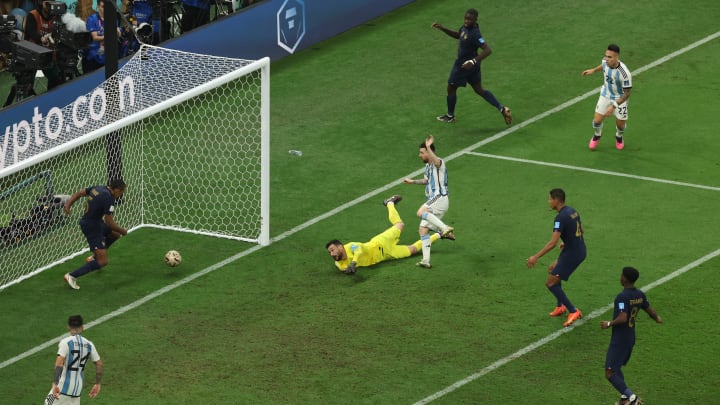Why Argentina's third World Cup final goal could have been disallowed
By Sean Walsh

Argentina are the new champions of men's football, wrestling the crown away from France during a breathless, enthralling and downright ludicrous World Cup final.
La Albiceleste were the slight underdogs heading into Sunday's showdown at the Lusail Iconic Stadium, but found themselves two goals to the good at half-time after Lionel Messi scored from the penalty spot and Angel Di Maria swept home at the end of a stunning counter attack.
France were at sixes and sevens, failing to register a shot until deep in the second half. Didier Deschamps even hauled off Ousmane Dembele and Olivier Giroud before half-time.
But up stepped Kylian Mbappe to score twice in two minutes - the second an unbelievable and immediately iconic volley - to send the match into extra-time.
There were several more twists and turns to come, but the first impactful moment of extra-time should maybe have had a different outcome.
France's harried defending was taken advantage of by Messi, who picked out Lautaro Martinez - played onside by the backside of Raphael Varane - and he fired at the midriff of Hugo Lloris. This effort fell kindly back into the path of Messi and he managed to just about convert from close range despite Jules Kounde's efforts to clear it off the line.
However, there has been fresh dispute over whether this goal should have stood.
French publication L'Equipe have argued that amid the scramble to get the ball over the line, some Argentina substitutes encroached onto the pitch, and this should have been deemed an illegal action and the goal chalked off.
L'Equipe even go as far as to specifically referencing Law 3 in the rules of the game, which states: "After a goal is scored, the referee becomes aware before play resumes that an additional person was on the pitch at the time the goal was scored: the referee must disallow the goal if the extra person was: a player, substitute, substituted player, sent off player or official of the team who scored the goal; play must be restarted with a direct free kick from the place where the extra person was."
Some suggestion that Lionel Messi's second goal should have been disallowed because 2 Argentina subs stepped onto the pitch to celebrate just before the ball crossed the line.
— Dale Johnson (@DaleJohnsonESPN) December 19, 2022
To the letter of the law perhaps, but it is far too insignificant to be within the remit of the VAR. pic.twitter.com/ZyL5c2k9eJ
However, as debunked by ESPN's Dale Johnson, this is far too insignificant a moment to warrant the goal to be ruled out.
Referee Szymon Marciniak - who was widely praised for his handling of the final, but given a measly 2/10 rating by L'Equipe - would have needed some unparalleled courage in order to even consider ruling the goal out for such a minor discrepancy.